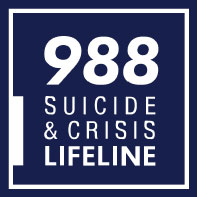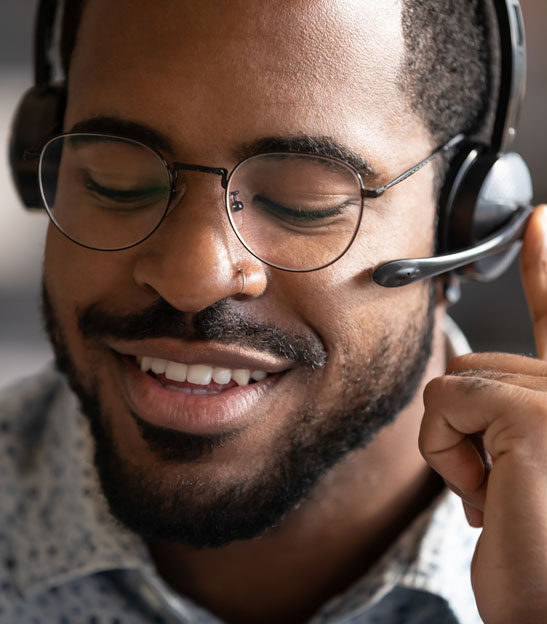-
The 988 Lifeline provides easy access to crisis support for emotional distress. 911 focuses on dispatching emergency medical services, fire, and police as needed.
Only a small percentage of 988 Lifeline contacts require activation of the 911 system. Most of those are done with the consent and cooperation of the help-seeker. This occurs when there is imminent risk to someone’s life that cannot be reduced during the call, text, or chat. In these cases, the crisis counselor shares information with 911 that is crucial to saving a life.
-
Yes, The 988 Lifeline is staffed with trained crisis counselors who are available 24/7, 365 days a year.
-
When you call 988, you’ll hear an automated greeting message that features additional options (option 1 for the Veterans Crisis Line, option 2 for the Spanish Line, option 3 for the LGBTQI+ Youth Subnetwork Line, and option 4 for the Native and Strong Lifeline). You can press 0 to skip these greetings or stay on the line to be connected to a trained crisis counselor. Once you are connected, this person will listen to you, work to understand what you’re experiencing, provide support, and collaborate with you on ways to feel better. They can also connect you with additional help or resources.
-
Crisis counselors can support you through any issue causing emotional stress or crisis. Some examples include:
- Thoughts of suicide or self-harm
- Depression and anxiety
- Feelings of isolation or loneliness
- Trauma
- Mental health conditions and symptoms
- Economic or relationship worries
- Abuse
- Worries about drug or alcohol use
- Concerns about a loved one who needs emotional or crisis support
- Any other concerns
-
The majority of people who call 988 get the help they need without emergency services. While a small number of health and safety issues may warrant a response from law enforcement or EMS, the 988 Lifeline is designed to provide one-on-one support with minimal disruption.
-
988 counselors are fellow Washington residents from communities like yours.
Our counselors are highly trained and ready to support you, no matter what you’re going through.
If a local crisis counselor is not available in a timely manner, then you may be directed to another trained crisis counselor in the United States. The 988 subnetwork lines for Native people, veterans and military families, LGBTQIA2S+ youth and young adults, Spanish speakers, and deaf and hard of hearing people are staffed by trained crisis counselors across the nation.
-
Washington has three 988 Lifeline crisis centers that answer calls, texts, and chats from around the state:
Your call, text, or chat will be directed to one of these crisis centers based on your area code. If one of the three centers can’t answer, you’ll be directed to the national backup center.
-
Yes, if you or someone you know is having thoughts of suicide or experiencing a mental health crisis, you can call 988 for 24/7 support. As with all 988 calls, your identity will remain anonymous.
-
The 988 Lifeline is supported by highly experienced, credentialed individuals who are required to undergo extensive training before answering a call, text, or chat.
Training is interactive and delivered in a variety of formats to promote skill learning. To ensure competency, crisis counselors undergo regular training and are often subject to skill checks.
Key areas covered in training include crisis counseling techniques, mental and emotional processes (internal systems), cultural humility, and diversity, equity, and inclusion.
All 988 Lifeline crisis centers adhere to accreditation standards set forth by the federally-designated 988 administrator: Vibrant Emotional Health.
For more information about crisis training, see Washington Crisis Center Best Practices.
-
Yes, People contacting the 988 Lifeline do not need to share personal information to receive support or services. Other than having the phone number or IP address you contacted them from, the crisis counselor will not know who you are or where you’re located. If you require 911 services, the crisis counselor may ask for information to share with 911 that may be crucial to saving a life.
-
The 988 Lifeline’s call, chat, and text features are all available in Spanish. You can also get interpretation services in over 240 languages and dialects if you call. To use this feature, call 988 and say the name of the language you need. You’ll be connected to an interpreter in about 20 seconds.
-
If you are Deaf or hard-of-hearing, you can chat with a 988 Lifeline counselor by:
- 988 Videophone – Call 988 with a VP number or connect through the web portal.
- Online chat
- 988 Text – Send any message to 988 to start a text conversation.
- For TTY Users: Use your preferred relay service or dial 711 then 988.
If you are a Veteran or service member with hearing loss or are concerned about someone who is:
- Text with a Veterans Crisis Line responder – Send a text message to 838255
- Online chat with a Veterans Crisis Line responder
More information for people who are Deaf or hard-of-hearing.
-
Yes, the 988 Lifeline is free and confidential for anyone seeking crisis support.
-
Yes, The 988 Lifeline is for anyone seeking emotional support for a wide range of reasons, for example:
- Depression and anxiety
- Feelings of isolation or loneliness
- Trauma
- Mental health conditions and symptoms
- Economic or relationship worries
- Abuse
- Worries about drug or alcohol use
- Concerns about a loved one who needs emotional or crisis support
- Any other concerns
-
Yes, you can dial 988 for substance use concerns, however, in the case of an overdose emergency, call 911 and administer naloxone.
-
The 988 Lifeline does not replace the NSPL phone number but provides an additional, local way for people to reach more crisis centers. You can call either 988 or 1-800-273-TALK (8255) to be connected.
-
The 988 Lifeline is partially funded by Congress through the American Rescue Plan and the President’s 2022 Fiscal Year Budget.
At the state level, the 988 Lifeline is funded by telecommunications fees allowed by the National Suicide Hotline Designation Act of 2020 as well as public and private sector funding streams.


